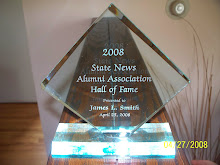One of my favorite topics is media hypocrisy. I've pointed out a couple examples in the past.
Arizona was the center of controversy back in the 1990s when it wouldn't designate Martin Luther King Holiday as a day off for its State employees. There were charges of boycotts and other protests at the time (some things never change).
The Flint Journal editorial page editor wrote a scathing editorial on how unjust it was that Arizona would not honor the Civil Rights leader by declaring his birthday a holiday.
I read the editorial with interest, because the Flint Journal at the time also did not give employees the MLK holiday. Still doesn't I believe. So I confronted the editor and said how could we write such an editorial knowing that our own company didn't honor the leader.
The answer was lame.
On Sunday, April 25 the Journal ran a story tracking the unremarkable results of tax credits and incentives given to companies in the city.
They forgot one company: The Flint Journal. The newspaper got a pretty nice deal from the city when it built its new printing plant 7-8 years ago. There were, as I recall, the promise of many new jobs at the plant and company in exchange for the deal.
Might have been a nice sidebar to Sunday's story on the other companies who didn't live up to expectations.
Thursday, April 29, 2010
Subscribe to:
Post Comments (Atom)


4 comments:
"other company's?"
Not only free from editors, but also free from copy editors...
As I have repeated several times, I am free from editors, but I could still use a good one.
Thanks for catching that, I'll fix it.
If I recall correctly, the Journal won the local economic development of the year award when it built its printing plant.
The FJ editorial folks supposedly take great pride in footnotes disclosing conflicts of interest, minor or otherwise. But this latest evidence of FJ editorial hypocracy points up another facet of these disclosures: the FJ discloses only when it serves as more of a benefit to, or is more complimentary of, the disclosee. How many times over the years has the FJ disclosed the publisher was on the board of this community organization or that charity board? It was a sneaky way of just re-broadcasting the many bright spots in the publisher's background. Yet when the disclosure itself is more of a negative, such as the FJ's tax credit entanglements, someone at the FJ, um, er, forgets to write it. Grooooaaaan!
Post a Comment